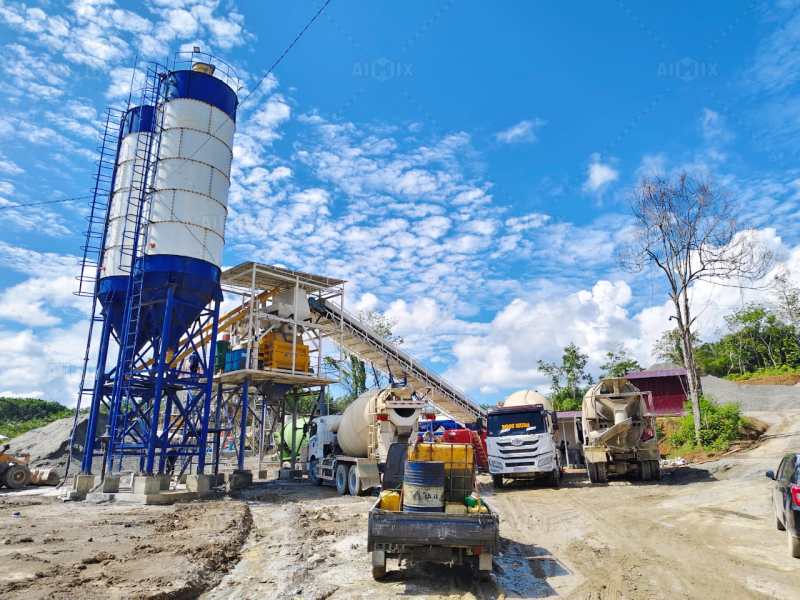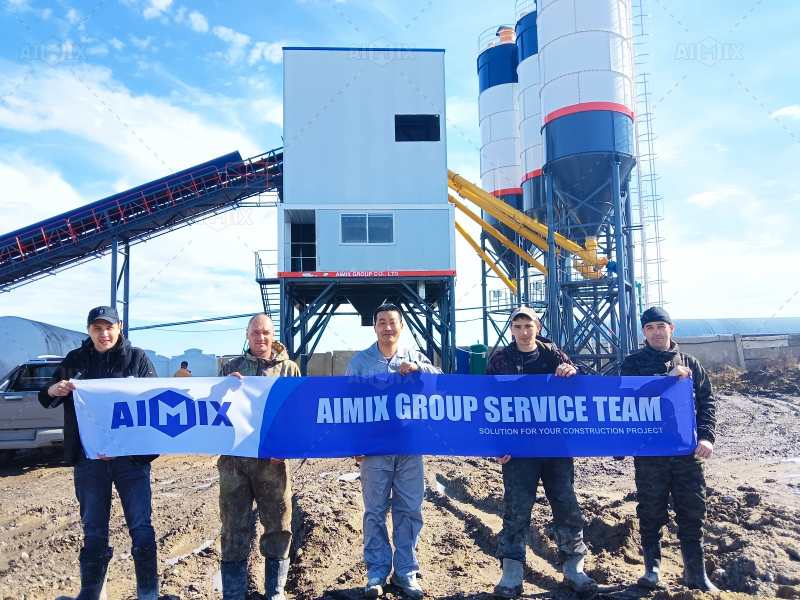Concrete batching plants are essential for construction projects, providing a consistent supply of concrete for various applications. While the initial investment in a batching plant is significant, ongoing operational costs can add up over time. One of the most effective ways to control and reduce these costs is by implementing efficient maintenance practices. Proper maintenance not only extends the lifespan of the equipment but also minimizes downtime, increases productivity, and reduces repair expenses. In this article, we’ll explore how efficient maintenance can reduce the overall costs of concrete batching plant.

Prolonging Equipment Lifespan
A well-maintained batching plant can operate efficiently for many years, significantly reducing the need for costly replacements. Routine checks and scheduled maintenance help prevent wear and tear on critical components such as the mixer, conveyor belts, and silos. Over time, neglected equipment can deteriorate, leading to more frequent breakdowns and the need for expensive part replacements or even a complete plant overhaul. By regularly inspecting and servicing equipment, businesses can ensure that each part functions optimally, thereby extending the plant’s lifespan and avoiding premature capital expenditures.
Preventing Unplanned Downtime
Unplanned downtime can be one of the most expensive issues faced by concrete batching plant operators. When equipment breaks down unexpectedly, it can bring the entire production process to a halt, causing delays that may result in missed deadlines, increased labor costs, and additional expenses for repairs. By adopting a proactive maintenance approach, operators can identify potential issues before they escalate into major problems. Regular maintenance tasks such as lubricating moving parts, checking for signs of wear, and replacing worn-out components can help avoid unexpected shutdowns. This ensures that the plant continues operating smoothly and without costly interruptions.
Reducing Repair Costs
While occasional repairs are inevitable in any industrial setting, efficient maintenance can drastically reduce the frequency and severity of repairs needed for a concrete batch plant. Small issues, if left unchecked, can quickly become costly to fix. For example, a worn-out bearing in the mixer can lead to significant damage to the entire mixing system if not replaced in time. By performing regular inspections and addressing minor issues as soon as they arise, plant operators can prevent these small problems from turning into major, expensive repairs. Additionally, scheduled maintenance allows for budgeted repair costs, helping to avoid the financial strain of emergency fixes.

Optimizing Plant Performance
A batching plant operating at peak efficiency uses fewer resources, including electricity, water, and raw materials. Regular maintenance tasks such as cleaning filters, calibrating scales, and monitoring the performance of automated systems can help ensure that the plant is running efficiently. This not only improves the quality of the concrete produced but also reduces energy consumption and material waste. Lowering operational inefficiencies directly translates into cost savings. For example, maintaining accurate weighing systems prevents the overuse of expensive materials like cement, while ensuring the correct amount of water in the mix helps avoid wasted batches due to improper consistency. If you are looking for a reliable plant or need technical support, you can choose a reliable batching plant manufacturer like AIMIX, and you can get professional service and quality equipment from the company.
Improving Safety and Reducing Liability Costs
A well-maintained batching plant is also a safer work environment. Equipment failures can lead to accidents, putting workers at risk and increasing the potential for liability claims. In some cases, injuries caused by faulty machinery can lead to costly lawsuits, increased insurance premiums, and project delays. By maintaining equipment in good working order, plant operators can create a safer environment for their employees, reducing the likelihood of accidents. Preventive measures such as regular inspections of safety features, ensuring proper guarding of moving parts, and maintaining electrical systems reduce the risk of injuries and help control liability costs.
Streamlining Operations Through Automation
Automation plays a crucial role in reducing operational costs and improving efficiency in modern batching plants. Automated systems help optimize concrete plant operations by controlling material input, mixing times, and output. However, even automated equipment requires regular maintenance to ensure it continues functioning at its best. Calibrating sensors, maintaining software updates, and checking the condition of automated components like control panels and motors are essential for avoiding malfunctions. When automation runs smoothly, it reduces labor costs, improves precision, and ensures consistent concrete quality, all of which contribute to lower overall operating expenses.
Developing a Maintenance Schedule
One of the most effective ways to ensure efficient maintenance is by developing a comprehensive maintenance schedule. This plan should outline daily, weekly, monthly, and annual tasks, from routine inspections and cleaning to more in-depth servicing of critical components. A structured maintenance schedule helps keep operators organized and ensures that no important task is overlooked. It also allows businesses to budget for maintenance costs more effectively, reducing the financial impact of unexpected repairs. Additionally, having a well-documented maintenance plan improves accountability among staff and ensures that the plant is always operating in top condition.
Conclusion
Efficient maintenance is a key factor in reducing the operational costs of a concrete batching plant. By focusing on regular inspections, preventing unplanned downtime, optimizing equipment performance, and ensuring workplace safety, businesses can extend the life of their batching plants, reduce repair costs, and maintain consistent production levels. While maintenance requires an upfront investment in time and resources, the long-term benefits of lower operating costs, improved efficiency, and reduced liability make it an essential practice for any concrete production business looking to remain competitive and profitable.